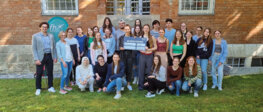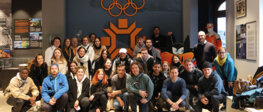Case study in Innovation(E)
Niveau der Lehrveranstaltung/des Moduls laut Lehrplan
First Circle
Lernergebnisse der Lehrveranstaltung/des Moduls
After completion of this course the students
· are in the position to apply desk research to
acquire theoretical and empirical knowledge about
the state-of-the-art
· have basic knowledge about what innovation is and
which aspects of innovation are important for
business
· are in the position to apply a project concerning
innovation in practice
· are in the position to present their project outcome
to managers and customers
Voraussetzungen laut Lehrplan
Not applicable
Lehrinhalte
The course delivers a combination of theory and practice
and students are therefore confronted with a high workload
as well as an interesting practice project for a local
company. The course contents contain respectively
include:
· Introduction into the course including presentation
of the process, the tasks and the aims of the
course
· Presentation of the company, its business model
and strategy as well as their external and internal
environment
· Presentation of the practical problems and the
association to innovation
· Formation of groups (4 – 5 students), which are
then instructed into the problem, the process and
the expected outcome
· Preparation of a scientific paper (including citations
and source: books, scientific papers and data) to
a.) to present the problem and its relevance, b.) to
elaborate the state-of-the-art (theory), which shall
be applied for a practical solution of the problem
and c.) a recommendation/solution including a rollout
plan for implementation in practice
· Summary of the main results and presentation in
from of the audience including discussion
empfohlene Fachliteratur
· Bessant, J., & Tidd, J. (2011). Innovation and
entrepreneurship. West Sussex: John Wiley &
Sons.
· Morris, M., Kuratko, D., & Covin, J. (2010).
Corporate entrepreneurship & innovation. Mason:
Cengage Learning.
· Shavinina, L. V. (2002). The international handbook
on innovation. Oxford: Elsevier Science.
· von Stamm, B. (2008). Managing innovation,
design and creativity. West Sussex: John Wiley &
Sons.
Bewertungsmethoden und -kriterien
Evaluation of the scientific paper, the presentation and the
participation on discussions
Unterrichtssprache
Englisch
Anzahl der zugewiesenen ECTS-Credits
4
eLearning Anteil in Prozent
0
Semesterwochenstunden (SWS)
2
geplante Lehr- und Lernmethoden
· introduction to the process of the study
· groups work including literature review (state-ofthe-
art) and preparation of a scientific paper (with
citations and sources) as well as application of the
theoretical knowledge on a real business case
· presentation
· discussion
Semester/Trimester, in dem die Lehrveranstaltung/das Modul angeboten wird
1
Name des/der Vortragenden
Prof. (FH) PD Dr. Mario Döller, Prof. (FH) Dr. Mario Situm
Studienjahr
1
empfohlene optionale Programmeinheiten
none
Kennzahl der Lehrveranstaltungen/des Moduls
IP_BUS120
Art der Lehrveranstaltung/des Moduls
Integrierte Lehrveranstaltung
Art der Lehrveranstaltung
Pflichtfach
Praktikum/Praktika
not applicable



